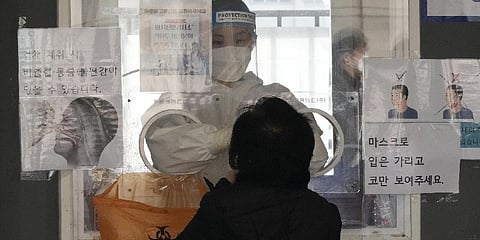

SEOUL: South Korea had its deadliest day yet of the pandemic on Tuesday, with 293 deaths reported in the latest 24 hours, as the country grapples with a record surge in coronavirus infections driven by the fast-moving omicron variant.
The 1,196 virus patients in serious or critical conditions were also a new high. Health officials said the country’s medical response remains stable following efforts to expand resources, with more than 30% of intensive care units designated for COVID-19 treatment still available. But the strain on the hospital system is expected to increase in the coming weeks, considering the time lags between infections, hospitalizations and deaths.
“We anticipate the number of (serious or critical cases) to grow to around 2,000. We are preparing our medical response for that,” senior Health Ministry official Park Hyang said during a briefing.
South Korea has reported a daily average of around 337,000 new cases in the past seven days, including 362,283 on Tuesday, representing more than an 80-fold increase from levels seen in mid-January, when omicron emerged as the dominant strain. The country’s caseload is now over 7.2 million, with 6.4 million added since February.
Park said because of high vaccination rates, the country has so far weathered the omicron surge with lower levels of fatalities than what was seen in the United States and Europe, which was hit by the variant earlier. More than 62% of South Koreans have received booster shots.
The country so far has 17.6 COVID-19 deaths per 100,000 people, compared to 285.5 deaths in the U.S. and 237.5 in Britain, according to the Korea Disease Control and Prevention Agency.
The omicron variant has forced South Korea to abandon a stringent COVID-19 response based on mass laboratory tests, aggressive contact tracing and quarantines to focus limited medical resources on priority groups, including people 60 and older and those with preexisting medical conditions. The country will also begin a vaccine rollout for children between the ages of 5 and 11 later this month.
More than 1.6 million virus carriers with mild or moderate symptoms have been asked to isolate at home to save hospital space, the KDCA said.